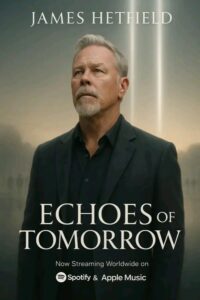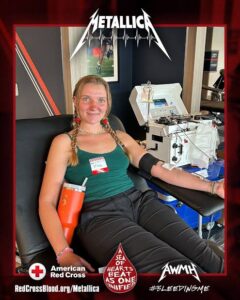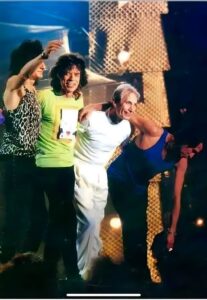
HEADLINE: “From Resistance to Redemption: The Powerful Journey of Self-Surrender and the Healing Force of Love”
By The Human Spirit Journal — October 25, 2025
For many, life is an endless race — not toward something, but away from it. Away from pain, away from memories, away from the mirror that reflects both who we are and what we fear becoming. For years, one individual’s quiet but profound confession—“After years of running from myself, I finally learned to surrender—to embrace my pain as a blessing, to trust love, and to allow it to change me”—has become a resonant anthem for anyone struggling to make peace with themselves.
This simple yet deeply human statement encapsulates a universal truth: we are often our own biggest obstacle to healing. It is only through surrender—not defeat—that transformation begins. This is a story of rediscovery, of learning that pain can be sacred, and that love, when trusted fully, has the power to reconstruct the human soul from its ruins.
The Long Road of Running
For years, the protagonist of this story (whose experience mirrors countless silent battles around the world) lived in constant flight — not from others, but from the self. The running took many forms: distraction through work, escape through relationships, numbing through endless motion. “It felt safer to stay busy than to sit still,” they recall. “Stillness meant feeling. And feeling meant facing the things I’d buried.”
Psychologists often describe this pattern as emotional avoidance, a coping mechanism that arises when people feel overwhelmed by grief, guilt, or trauma. Yet avoidance, though protective in the short term, slowly corrodes the soul. It disconnects us from our inner truth and locks us in cycles of anxiety, dissatisfaction, and emotional fatigue.
Behind the façade of control, the heart grows restless. The harder one tries to suppress the pain, the louder it knocks. Until one day, exhaustion wins. Not the kind of exhaustion that sends you to bed — but the kind that sends you inward.
The Moment of Surrender
True surrender is not an act of weakness; it’s an act of courage. It happens when running becomes impossible, and silence becomes unavoidable. “I remember the moment clearly,” the narrator shares. “It wasn’t dramatic. I just stopped. I sat with myself — with everything I’d avoided — and I didn’t move. For the first time, I didn’t fight it.”
That stillness became the first step toward transformation.
In spiritual traditions across the world, surrender is often seen as the threshold between resistance and grace. In Christianity, it’s the letting go that allows divine love to flow in. In Buddhism, it’s the acceptance of suffering as part of life’s nature. In psychology, it’s the turning point where self-awareness begins to heal the unconscious mind.
What unites these perspectives is a single truth: healing begins where resistance ends.
Embracing Pain as a Blessing
To embrace pain is to redefine its meaning. Pain, in itself, is not the enemy—it’s the messenger. It tells us where love has been withheld, where forgiveness has not yet reached, and where healing must occur.
“I used to think pain meant I was broken,” the narrator says. “Now I see it as my teacher. Every heartbreak, every loss, every moment of failure showed me something I refused to learn otherwise. Pain broke me open — and that was its gift.”
This awakening reflects a profound psychological shift — what experts call post-traumatic growth. It’s the paradoxical process through which people emerge stronger, wiser, and more compassionate after suffering. Studies from institutions like Harvard and Stanford have documented how emotional pain can catalyze empathy, resilience, and purpose when met with self-compassion rather than shame.
Pain, when embraced, becomes a sacred compass — guiding us not away from ourselves, but deeper within.
Learning to Trust Love Again
After years of guarding the heart, learning to trust love can feel terrifying. It requires unlearning the instinct to protect, to expect hurt, to anticipate disappointment. But trust is the soil in which love grows.
“Trusting love didn’t mean trusting people to never hurt me,” the narrator explains. “It meant trusting that love itself — as a force, as a truth — would never betray me. Even when people did. Even when I did.”
Love, in its truest form, is not possession or perfection. It is a current that moves through us — patient, forgiving, and quietly transformative. When one stops resisting it, it becomes the most natural healing force in existence.
Experts in emotional recovery emphasize that self-trust and love are inseparable. The moment one begins to love themselves without conditions, they stop fearing the love of others. Vulnerability becomes strength. Intimacy becomes sacred. And life, once a battlefield, becomes a sanctuary.
Allowing Love to Change You
Change doesn’t happen overnight — but the decision to allow it begins in an instant. That permission, that “yes” to life as it is, marks the end of the old self and the rebirth of a new one.
“When I stopped trying to control everything and simply allowed love to work through me,” the narrator reflects, “I started to notice the smallest miracles. I forgave people I thought I never could. I started listening more, speaking less. I began to see beauty in what I used to call pain.”
Transformation, then, is not about becoming someone else. It’s about returning to who we were before fear taught us to run.
Love changes not by force, but by presence. It softens the sharp edges, quiets the mind, and restores the heart to its natural rhythm. The world doesn’t necessarily change — but how we see it does. And that shift, in perspective and in spirit, changes everything.
A Universal Awakening
This story, though deeply personal, is not unique. Across the globe, more people are awakening to the power of emotional honesty and spiritual surrender. In an era obsessed with achievement and distraction, many are rediscovering the quiet revolution of turning inward.
Workshops on mindfulness, trauma healing, and self-compassion are thriving. Social movements advocating mental health awareness are giving language to what past generations silenced. The collective message is clear: strength is not in suppression — it’s in surrender.
By embracing pain, trusting love, and allowing it to change us, we don’t escape our humanity — we fulfill it.
The Message for Us All
The confession that began this story is not merely personal testimony; it is a roadmap for anyone searching for peace. Its truth reverberates through every heart that has ever been broken, every soul that has ever felt lost:
“After years of running from myself, I finally learned to surrender—to embrace my pain as a blessing, to trust love, and to allow it to change me.”
To surrender is to come home. To embrace pain is to transform it. To trust love is to live.
In a world that often glorifies control, winning, and endurance, this story reminds us of the quiet power of yielding — not giving up, but giving in to what is real, raw, and redemptive.
Because when we stop running, we finally realize: the thing we were fleeing from was never an enemy — it was the unhealed part of us that only ever wanted to be loved.
And when love is finally allowed to do its work, even the deepest wounds become the brightest windows to the soul.





